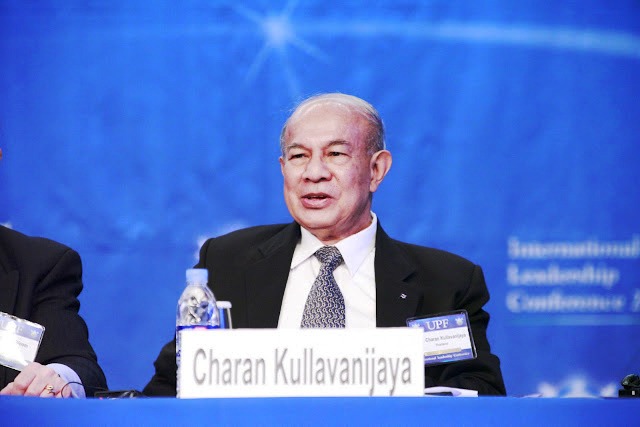![]()
The Words of the Kullavanijaya Family
|
|
The Words of the Kullavanijaya Family |

The national power of a country may be considered to have tangible and intangible aspects. Tangible powers include the population size, sovereignty, leadership and Chief of State, natural resources, administration and governance, freedom, dependency, economy, politics, national defence, human security, science, technology, energy, ecology, and the environment. Intangible powers include languages, history, faiths and religions, customs, rites, traditions, identity, and national prestige.
The population of a country may include people of many tribes, languages, religions, and faiths. What they all want is security, peace, justice, equality, freedom, and the right to property, honor, and progress.
I hope you would all agree with me that the ultimate need of human being is not only wealth, property, health, or security. We really do need friends. I'm not referring to sexual desire. The fact is that wherever human beings exist, they want others to be there with them. Nobody likes to remain alone. Human existence teaches us how to give and to take, lose and gain, be friend or foe, love or hate, cooperate or compete. Hence, someone who has a lot of good friends is considered more fortunate than someone who has fewer. Good friends and good companions, with their sincere counsel, advice, and assistance, will always be welcomed. Through cooperation, we can live together, think together, do things together, and help one another. During happy and unhappy times, friendships are maintained.
What, then, are the obstacles to living together in peace?
High technology in both communications and transportation make the world smaller.
Displacement of people, especially in the ASEAN (Association of South East Asian Nations) community, may increase.
As people age, they often need more health care, while young people tend to have fewer children, spend more money on food and leisure, and show less interest in traditions and religious rites.
As people pay attention to the more distant world, they may be inclined to believe information they receive without developing the wisdom and good judgment to evaluate it; therefore, misunderstandings, conflicts, and radicalization may result.
Segmentation of society and regionalism may accentuate differences among people, resulting in inequality and injustice.
The Pattani region on southern Thailand's east coast was a wealthy seaport some 800 years ago. It became a sovereign state under Siam during the Sukhothai period (1238-1583), in which Hinduism and Buddhism were the main religions, and the rulers were Buddhists. During the Ayutthaya era (1350 to 1767) Pattani was a self-governing principality paying tribute to a king in what is now northern Thailand. The chiefs of Pattani became Muslims in 1405, influenced by the spread of Islam brought by Indian and Arab traders. After a trade route was established Malacca (on the west coast of what is now Malaysia) in 1567, the Pattani state often rebelled against Ayuddthaya; this continued until western colonization around 1893. Under British rule, part of the Pattani region remained with Thailand and part became Malaya.
The Pattani legacy as an Islamic state separate from the Thai government to the north lives on in religion, language, and tradition; religious differences are used as fight. Raising the point of unjust, unfair, poverty and different in tradition language and faith as the cause to separate.
With people of various religions and faiths living in southern Thailand, cooperation can be facilitated by religious leaders based on religious principles. The participation of local people in administration and logistics should be promoted as a way of peace-building.
His Majesty the King, as the Chief of State, clearly understands that the problems in the region are not rooted in differences in faith. His advice is for all the people to cooperate peacefully. Getting rid of drugs, crimes, and illegal trade in both merchandise and human beings should be expedited. He encourages the strategy of "approaching and developing."
"Sufficiency Economy" is also the philosophy promoted by H.M. the King over the past three decades; it emphasizes a "middle path" at all levels, from the family and communities up to the nation. "Sufficiency" means moderation, reasonableness, and protection from negative impacts due to internal and external changes.
Brief background note contributed by UPF-Thailand: The insurgencies in the southeastern tip of Thailand started more than 50 years ago. There are religious, language, and cultural differences between people in the southern region and other parts of Thailand; there are many conservative Muslims, and people have felt that government officials, including police and soldiers, did not respect them but rather looked down on them. The Krue Se Mosque and Tak Bai incidents in 2004 and 2005 strengthened extremist elements and escalated a separatist campaign. Heavy weapons have been imported with the support of extremist elements from outside Thailand, and there have been hundreds of cases of bombings and shootings. Many people criticized former Prime Minister Thaksin Shinawatra for his way of dealing with the violence, including kidnapping the head of the Muslim lawyers association of Thailand who lived in that area. A military junta that deposed Prime Minister Thaksin and later coalition governments have attempted to deal with the insurgency, but without success.